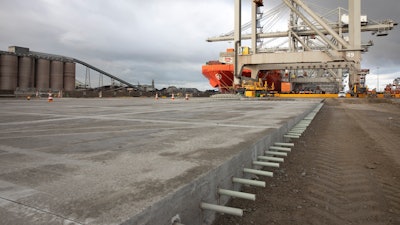How Composites are Transforming the Landscape of Building Products
The Role of Recycled Compounds: Enhancing Efficiency and Sustainability Efforts
In today's ever-evolving landscape of materials design and sustainability campaigns, the application of recycled compounds has actually arised as a compelling area of rate of interest. These innovative products provide a special blend of enhanced performance capacities and environmental benefits that hold significant pledge for a wide array of industries. By taking advantage of the power of recycled compounds, organizations can not only elevate their operational effectiveness and product high quality however likewise add to an extra lasting future. The elaborate interplay in between these composites, efficiency metrics, and sustainability goals paints a fascinating picture of potential developments yet to be completely discovered.
Advantages of Recycled Composites
Recycled compounds supply a lasting remedy that not just improves performance however additionally minimizes environmental impact in various sectors. Among the vital benefits of utilizing recycled compounds is their ability to draw away waste from land fills. By including products such as recycled plastics or carbon fiber into making procedures, business can decrease the quantity of waste generated and advertise a circular economy.
Moreover, recycled compounds typically exhibit equivalent or also exceptional mechanical properties to virgin materials. This implies that items made from recycled compounds can preserve high efficiency criteria while being more eco-friendly. Additionally, using recycled composites can help firms meet their sustainability objectives and minimize their carbon footprint.

Performance Benefits of Recycled Composites
Enhancing structural honesty and longevity, recycled composites provide noteworthy efficiency advantages in various industrial applications. One considerable advantage is the boosted strength-to-weight ratio that recycled compounds provide. This property is especially essential in markets such as aerospace, auto, and building, where lightweight products that keep high toughness are very searched for.

Additionally, recycled compounds offer exceptional fatigue resistance compared to several typical products - composites. This characteristic is crucial in sectors subject to cyclic loading or vibrant stress and anxieties, as it assists protect against premature failure and ensures lasting reliability
Moreover, recycled compounds can be customized to satisfy specific performance demands by readjusting the type and percentage of recycled materials made use of in their production process. This customization capacity enables for the development of high-performance compounds that resolve the distinct requirements of various industries, further highlighting the efficiency advantages of recycled compounds.
Environmental Impact of Recycled Compounds
The adoption of recycled compounds in different industries has motivated a closer assessment of their environmental influence. When evaluating the environmental effects of recycled compounds, it is critical to take into consideration both their production procedure and end-of-life disposal. In contrast to traditional compounds, recycled composites supply the benefit of diverting waste from landfills and minimizing the need for resources extraction (composites). This facet adds to reduce energy consumption and greenhouse gas emissions throughout the production phase, straightening with sustainability purposes.
Furthermore, making use of recycled compounds can cause a decline in overall carbon footprint and environmental contamination. By integrating recycled products into new composite items, companies can add to resource conservation and waste reduction efforts. Furthermore, the toughness and long life of recycled compounds can prolong item life-span, further lessening ecological impact. Despite these advantages, difficulties such as preserving material top quality and guaranteeing proper recycling facilities exist. Continued research and development in this area are important to maximize the environmental performance of recycled composites and advancement sustainable methods throughout markets.
Applications of Recycled Compounds
Various markets have embraced the application of recycled composites as a result of their flexibility and performance-enhancing residential properties. Among the crucial applications of recycled compounds remains in the automotive market, where they are utilized to produce lightweight elements such as bumpers, indoor panels, and under-the-hood components. These compounds assist minimize the overall weight of cars, boosting fuel effectiveness and minimizing carbon exhausts.
In the construction sector, recycled compounds are progressively being used to produce durable and weather-resistant building products. These products provide high view it strength-to-weight ratios, making them excellent for applications such as roof, cladding, and decking. Furthermore, making her comment is here use of recycled composites in infrastructure tasks, such as tunnels and bridges, has actually gained traction because of their longevity and resistance to corrosion.
Moreover, the aerospace sector depends on recycled compounds to generate airplane components that require high strength and tightness. These composites play a critical duty in enhancing the performance and gas efficiency of airplane while lowering maintenance costs. On the whole, the varied applications of recycled composites throughout industries highlight their considerable contribution to boosting sustainability efforts and enhancing efficiency standards.
Future Outlook for Recycled Composites
With an increasing concentrate on sustainability and advancement, the future expectation for recycled composites in various industries shows up appealing. As firms make every effort to satisfy environmental objectives and lower their carbon impact, the demand for lasting products like recycled composites is anticipated to climb substantially. Industries such as auto, construction, consumer, and aerospace goods are progressively transforming to recycled compounds as a result of their light-weight, resilient, and environmentally friendly buildings.
In the automotive industry, the usage of recycled compounds in vehicle manufacturing is projected to enhance as automakers look for to produce lighter and more fuel-efficient cars. In the building industry, there is a growing rate of interest in utilizing recycled compounds for facilities projects to reduce waste and improve sustainability. The aerospace sector is likewise checking out the potential of recycled composites for aircraft components to improve fuel efficiency and lower exhausts.
Verdict
The applications of recycled composites are substantial, varying from construction to vehicle sectors. Relocating ahead, the use of recycled compounds is anticipated to proceed to expand as firms and markets focus on sustainability initiatives in their operations.
In today's ever-evolving landscape of materials design and sustainability campaigns, the usage of recycled compounds has actually arised as a compelling area of passion. In contrast to conventional compounds, recycled composites offer the advantage of diverting waste from garbage dumps and decreasing the requirement for raw products removal. click here to read By incorporating recycled products right into new composite items, business can add to resource preservation and waste reduction efforts.In the construction industry, recycled composites are progressively being made use of to develop weather-resistant and sturdy building materials. As business make every effort to satisfy environmental objectives and decrease their carbon impact, the demand for sustainable materials like recycled composites is expected to climb substantially.